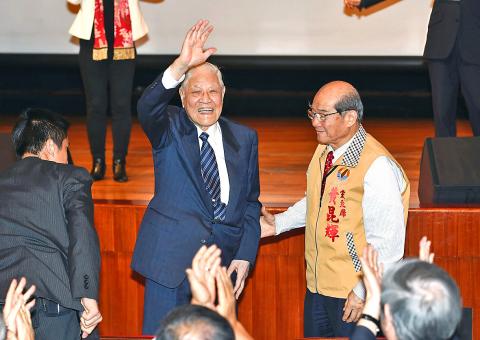Former president Lee Teng-hui’s (李登輝) condition has stabilized after he had a minor stroke, but he is to remain hospitalized under observation, Lee’s office said yesterday.
“Lee was sent to the Taipei Veterans General Hospital in the early hours of Friday after experiencing numbness in his right hand,” Lee’s office director Wang Yan-chun (王燕軍) said in a statement issued yesterday afternoon.
Following a series of examinations, Wang said the hospital concluded that Lee’s symptoms were caused by an embolism that occurred in the small peripheral arteries of the left hemisphere of his brain.

Photo: Fang Pin-chao, Taipei Times
Due to the hospital’s attentive care and treatment, Lee’s condition has stabilized and he will remain in the hospital to recuperate, Wang said.
“We appreciate everyone’s concerns, but we have to decline any visitors during Lee’s time in hospital in accordance with doctors’ advice,” Wang said.
Separately yesterday, Democratic Progressive Party (DPP) presidential candidate Tsai Ing-wen (蔡英文) said she was aware of Lee’s condition, but has not had the time to visit him in person, adding that DPP Secretary-General Joseph Wu (吳釗燮) has called Lee’s office to pass on her regards.
Lee, 92, served as president from 1988 to 2000.
In 1988, then-vice president Lee became the first Taiwan-born president when then-president Chiang Ching-kuo (蔣經國) passed away. Lee became the first popularly elected president of Taiwan in 1996.
In July 2013, Lee underwent vertebral artery stenting surgery after he suffered from a vertebral artery occlusion.
He was diagnosed with colon cancer in November 2011, when he had a tumor estimated at 3.5cm by 2.5cm removed.

CHAOS: Iranians took to the streets playing celebratory music after reports of Khamenei’s death on Saturday, while mourners also gathered in Tehran yesterday Iranian Supreme Leader Ayatollah Ali Khamenei was killed in a major attack on Iran launched by Israel and the US, throwing the future of the Islamic republic into doubt and raising the risk of regional instability. Iranian state television and the state-run IRNA news agency announced the 86-year-old’s death early yesterday. US President Donald Trump said it gave Iranians their “greatest chance” to “take back” their country. The announcements came after a joint US and Israeli aerial bombardment that targeted Iranian military and governmental sites. Trump said the “heavy and pinpoint bombing” would continue through the week or as long

TRUST: The KMT said it respected the US’ timing and considerations, and hoped it would continue to honor its commitments to helping Taiwan bolster its defenses and deterrence US President Donald Trump is delaying a multibillion-dollar arms sale to Taiwan to ensure his visit to Beijing is successful, a New York Times report said. The weapons sales package has stalled in the US Department of State, the report said, citing US officials it did not identify. The White House has told agencies not to push forward ahead of Trump’s meeting with Chinese President Xi Jinping (習近平), it said. The two last month held a phone call to discuss trade and geopolitical flashpoints ahead of the summit. Xi raised the Taiwan issue and urged the US to handle arms sales to

State-run CPC Corp, Taiwan (CPC, 台灣中油) yesterday said that it had confirmed on Saturday night with its liquefied natural gas (LNG) and crude oil suppliers that shipments are proceeding as scheduled and that domestic supplies remain unaffected. The CPC yesterday announced the gasoline and diesel prices will rise by NT$0.2 and NT$0.4 per liter, respectively, starting Monday, citing Middle East tensions and blizzards in the eastern United States. CPC also iterated it has been reducing the proportion of crude oil imports from the Middle East and diversifying its supply sources in the past few years in response to geopolitical risks, expanding

Pro-democracy media tycoon Jimmy Lai’s (黎智英) fraud conviction and prison sentence were yesterday overturned by a Hong Kong court, in a surprise legal decision that comes soon after Lai was jailed for 20 years on a separate national security charge. Judges Jeremy Poon (潘兆初), Anthea Pang (彭寶琴) and Derek Pang (彭偉昌) said in the judgement that they allowed the appeal from Lai, and another defendant in the case, to proceed, as a lower court judge had “erred.” “The Court of Appeal gave them leave to appeal against their conviction, allowed their appeals, quashed the convictions and set aside the sentences,” the judges